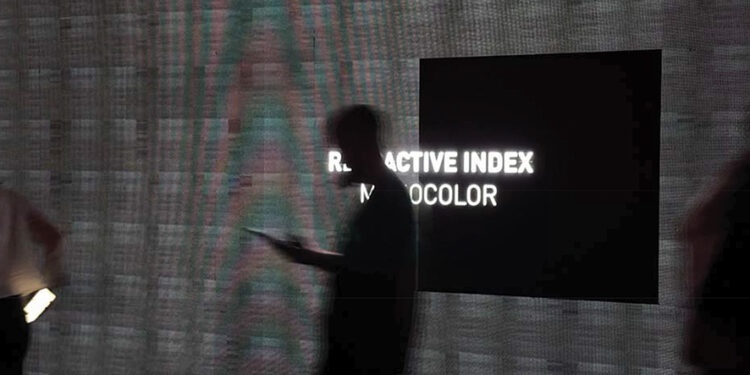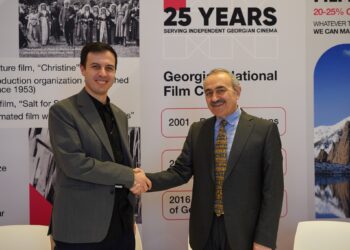TKESHI 2025 does not take place in the pine-scented sanctuary of Kojori. It takes place in exile. It takes place across the fractured surface of Tbilisi, scattered between rooftops and basements, radio stations and nightclubs. And yet, this year’s edition of Georgia’s foremost new media and experimental sound festival may be its most important — because it stages not only art, but defiance. Denied access to its natural site by Tbilisi City Hall under the vague language of “safety concerns,” TKESHI re-emerges as a nomadic organism, a moving constellation of frequencies and projections, resisting cultural silencing through multiplication.
The transformation of space — from immersive woodland experience to the charged atmospheres of urban sound-rooms — reconfigures the festival’s language. In the absence of the forest, the sonic becomes the terrain. The body of the listener is the site. The curatorial gravity of TKESHI 2025 leans into the presence of international artists who function here not as guests, but as co-conspirators. Their works, imported across borders, resonate with the local tension and amplify the deeper frequency of unease, vulnerability, and resistance.
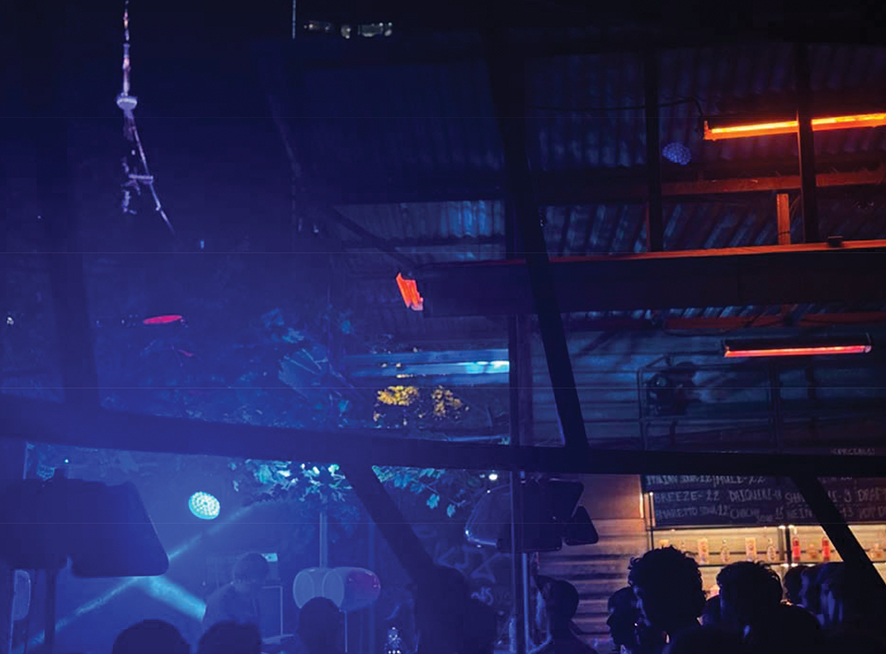
No Forest, No Problem? The Political Geography of Sound
There’s no way to separate TKESHI’s programming from the political climate in which it unfolded. Georgia’s new “foreign agents” law, the shrinking space for independent institutions, and the general sense of institutional inertia have made cultural production in the country increasingly precarious. The fact that a media art and experimental music festival proceeded at all this summer felt like a kind of quiet provocation.
But rather than leaning on overtly activist gestures, TKESHI worked more subtly. The relocation from nature to city — from forest installation to club system — transformed the festival’s media logic. Sound became the medium of spatial critique. The fragmentation of venues (Mutant Radio, Left Bank, TES, Tbili orgia) mirrored the fragmentation of public trust. The program’s layering of ambient, drone, AV performance, and collaborative sets articulated less a genre than a shared orientation: toward decentralization, complexity, and attention.
A number of international artists provided structural weight and texture to the two-day event — not as headliners, but as reference points in an ongoing conversation between local and global experimental practices.
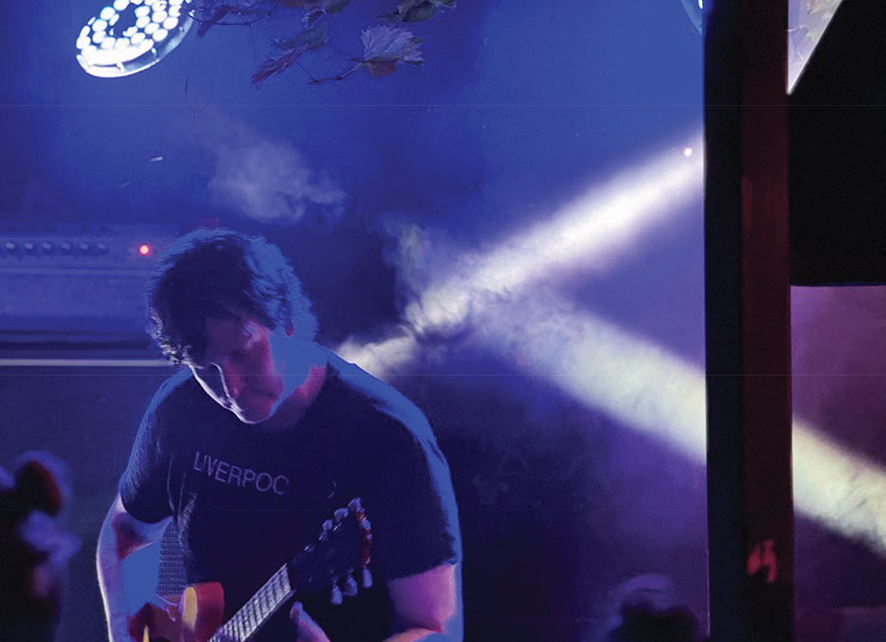
Rafael Anton Irisarri: Memory as Frequency
A longtime figure in ambient and drone music, Rafael Anton Irisarri is often described in visual terms — oceanic, cinematic, immersive. But what he delivered at Left Bank on July 17 was something more tactile. His compositions, layered from bowed guitar, tape loops, and degraded field recordings, didn’t just wash over the crowd. They pressured it.
What made his set resonate in the context of TKESHI wasn’t the usual ambient vocabulary of softness or slowness. It was the way his music enacted a kind of sonic archaeology — a method of excavation. His textures felt built on buried signals, half-erased messages, shared atmospheres that refused to resolve. In a post-Soviet space where architecture itself often seems haunted by interrupted futures, Irisarri’s music didn’t offer escape. It offered fidelity — to loss, to duration, to the low hum of structural decay.
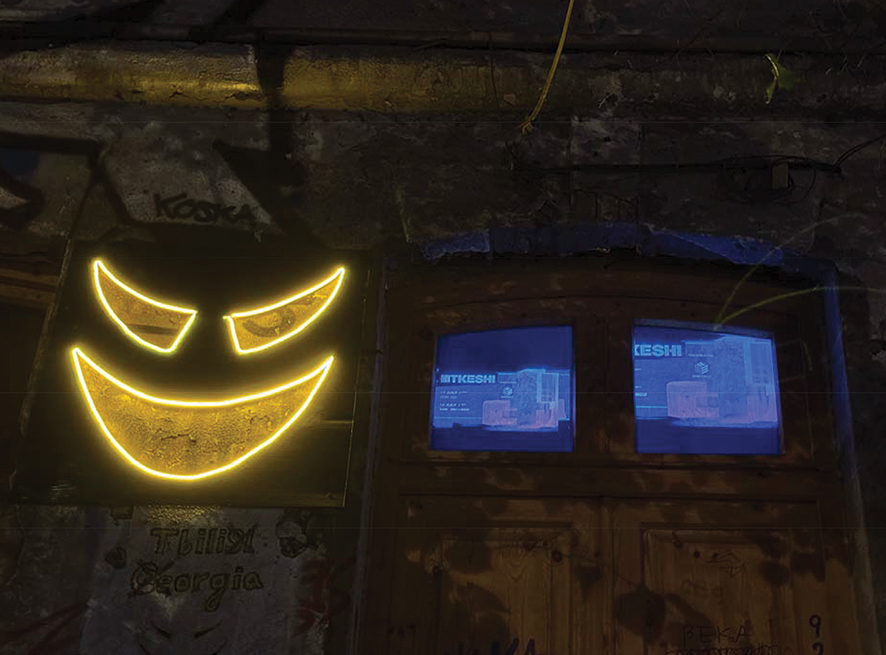
MIZU: Cello as Dislocation Device
MIZU, a cellist and sound artist from New York, doesn’t make ambient music in the traditional sense. Her sound, constructed from multitracked cello, electronic processing, and spatial reverb, lands closer to contemporary chamber music disassembled in real time.
Performing at Tbili orgia just past midnight, she brought something rare to the festival’s otherwise mostly digital ecology: emotional proximity. Her work unfolded in slow gestures, micro-resonances, and momentary climaxes that never overstayed. And yet it never felt sentimental. Her cello wasn’t lyrical — it was architectural, mapping spaces through resonance.
What made MIZU’s performance relevant wasn’t just its sonic palette but its social temperature. It modeled another kind of public intimacy — one rooted in vulnerability and attention. In a time when institutions are failing and language feels depleted, that’s not a side effect: it’s function.
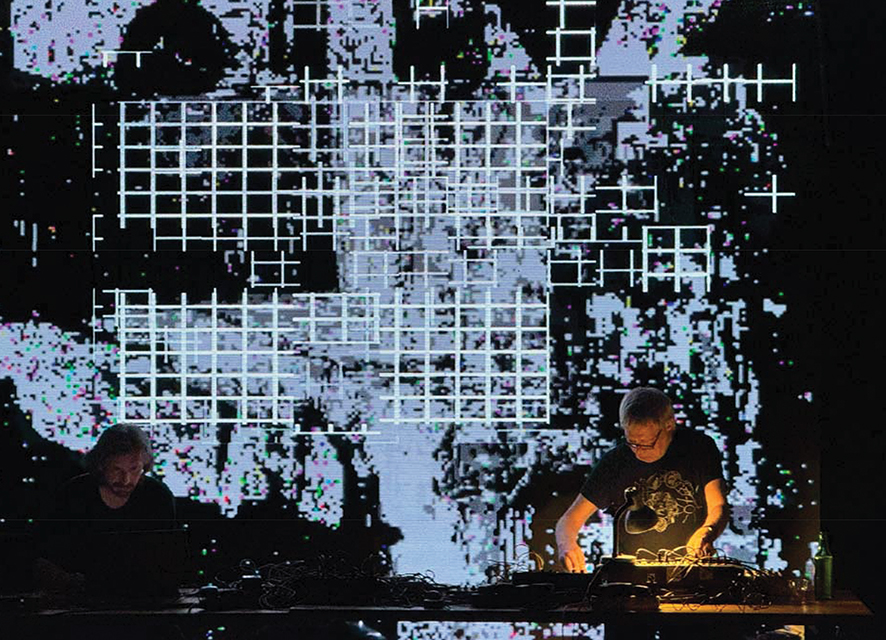
Ilpo Väisänen: The Anti-Spectacle as Form
For audiences familiar with Pan Sonic, Ilpo Väisänen’s performance at Mutant Radio likely carried historical weight. But it would be a mistake to see his appearance as legacy booking. Väisänen’s set — raw, analog, dub-adjacent — was as much a critique of festival aesthetics as it was a performance.
Working with custom electronics and no-frills signal chains, Väisänen delivered one of the most materially grounded sets of the weekend. There was no drama, no arc, no gesture toward climax. Instead, the music did something subtler: it occupied the room, reconfiguring audience attention around texture, pulse, friction. In a festival that had just lost its venue due to government intervention, this anti-spectacular mode felt like more than an aesthetic choice. It felt like a theory of presence — showing up, staying low, making noise anyway.
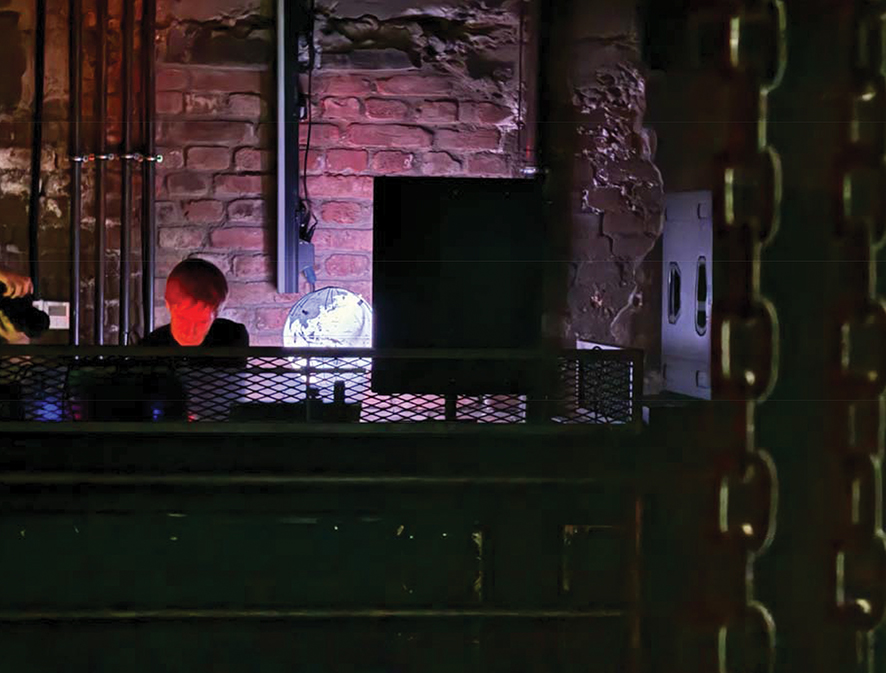
Amelie Duchow: AV as Cognitive Experiment
Amelie Duchow, performing at Left Bank under the Goethe-Institut’s cultural program, brought a rigorously conceptual approach to audiovisual media. Her work, grounded in microsound, generative structure, and perceptual play, wasn’t easy to digest. That was the point.
Her performance invited slow cognition. Sounds hovered at the edge of audibility. Visuals emerged as if from peripheral vision. The work wasn’t designed to entertain but to recalibrate — your hearing, your attention span, your assumptions about what a performance is supposed to do. Duchow’s inclusion also pointed to a broader, often overlooked aspect of media art: its ability to model epistemological alternatives. At a time when official narratives are collapsing and information systems are being manipulated, a practice rooted in ambiguity and layered perception becomes politically legible.
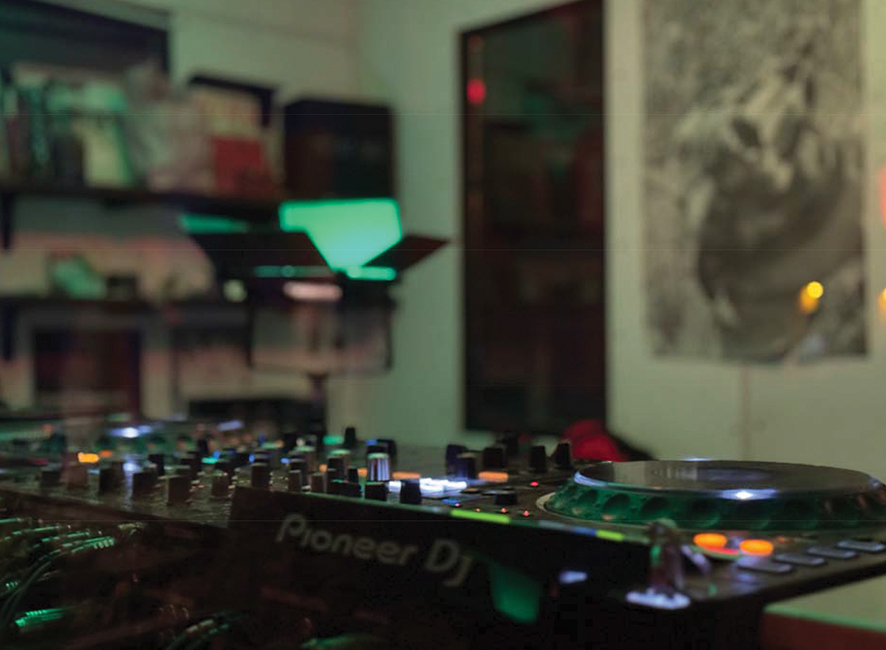
Grischa Lichtenberger: Digital Materialism and Emotional Lag
Grischa Lichtenberger’s set at TES was perhaps the most explicitly philosophical. A longtime affiliate of Raster, and trained in philosophy and art history, his work is often described as “difficult” — fragmented, glitch-heavy, and emotionally oblique.
But at TKESHI, that difficulty became a mode of clarity. In a venue with unpredictable lighting and improvised acoustics, his materials (disrupted loops, partial melodies, algorithmic edits) spoke directly to the condition of the festival itself. Lichtenberger’s sound didn’t pretend to be finished. It exposed its scaffolding. There’s something useful in that. Amid a cultural sector where surface polish is often mistaken for professionalism, Lichtenberger’s aesthetic of damage — of things breaking, recovering, repeating — felt honest. Not performatively so, but functionally.
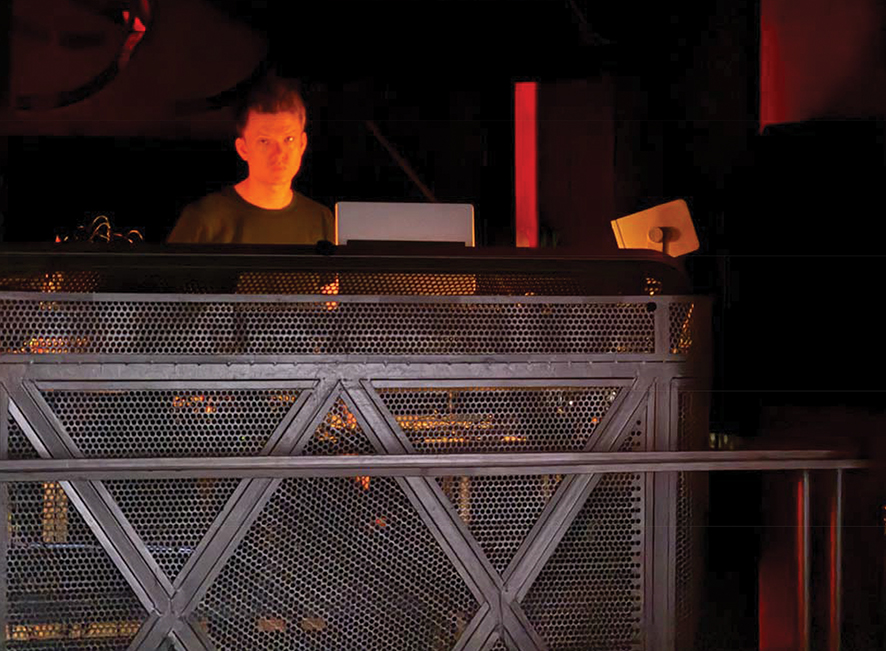
MONOCOLOR: Immersion Without Immersionism
Vienna-based MONOCOLOR filled the TES main stage with a fully immersive audiovisual set built on generative processes. His work — award-winning, meticulously coded, algorithmically evolving — had all the hallmarks of what media art often tries (and sometimes fails) to be: hypnotic, precise, spatially expansive.
But MONOCOLOR’s genius lies in his restraint. His visuals didn’t overwhelm. They unfolded. His sound design — modular, spatial, paced — respected cognitive space. The immersive quality of his performance came not from scale, but from calibration. In a venue with no fixed stage, no seating, and fluctuating crowd density, his piece became a kind of environmental software — shaping the conditions of perception rather than dominating them. This is what media theorist Matthew Fuller calls media ecologies — environments shaped not by content but by process.
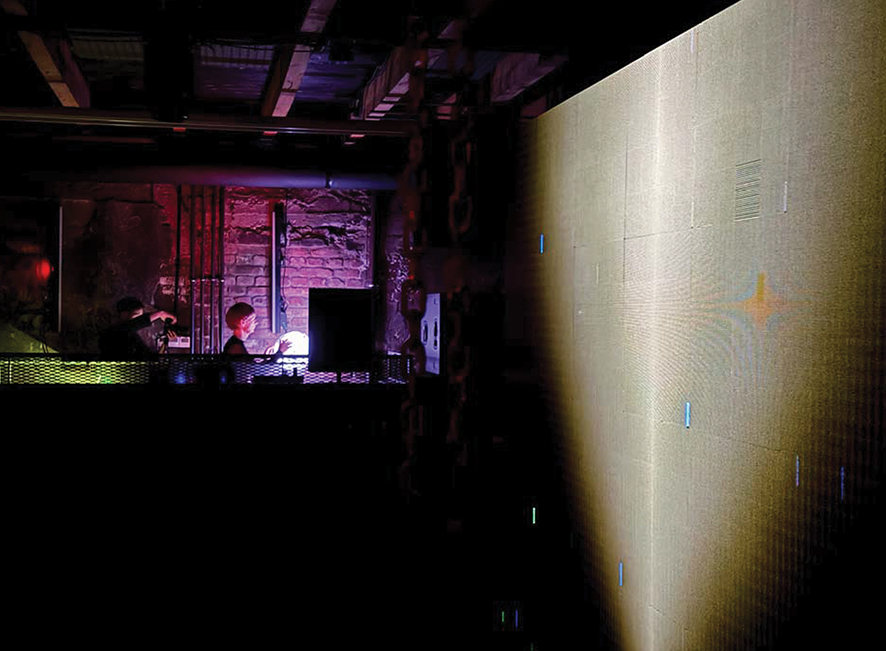
What the Local Scene Is Actually Doing
If international guests gave the festival legibility, Georgian artists gave it direction. This year’s edition suggested that the local experimental scene has become less about genre identity and more about methods: distributed authorship, improvisational curation, and collaborative forms of technological literacy.
Artists like Nikakoi Atlas, Mariam Songulashvili, Idealproblems, and Progenol appeared in multiple constellations — sometimes solo, sometimes in hybrid sets. This recombinatory logic isn’t just pragmatic (in a scene with limited resources, artists necessarily wear multiple hats); it’s also aesthetic. The emphasis is on process, not brand. Sound as practice, not product.
The sprawling multi-artist lineup at Tbili orgia, particularly on July 18, functioned less like a party and more like an ecosystem. What happens when twenty artists, many of them emerging or experimental, rotate through a two-floor space with overlapping time slots and shared gear? Something less like a performance and more like a distributed composition. At its best, it felt like collective media — not in the utopian sense, but in the sense of shared constraint.
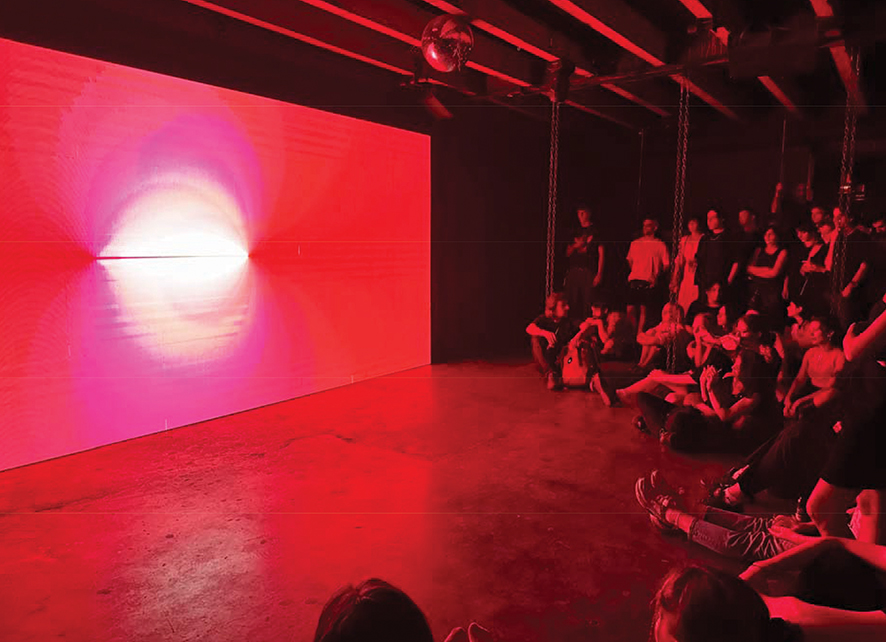
The Medium Is the Situation
One of the quiet successes of TKESHI 2025 was how well it functioned as an implicit critique of media infrastructure. The whole event read like a case study in how cultural practice adapts when public institutions fail.
Take the venues themselves: independent, semi-formal, embedded in the city’s nightlife circuit but not reducible to club culture. Take the artists: working across live coding, AV, drone, glitch, and site-specific installation. Take the audience: neither mass nor niche, but something in-between — a distributed community organized more by interest than identity.
In the absence of funding, security guarantees, or even stable electricity in some cases, the TKESHI team managed to produce a temporary public. And not just any public: one attuned to nuance, error, duration.
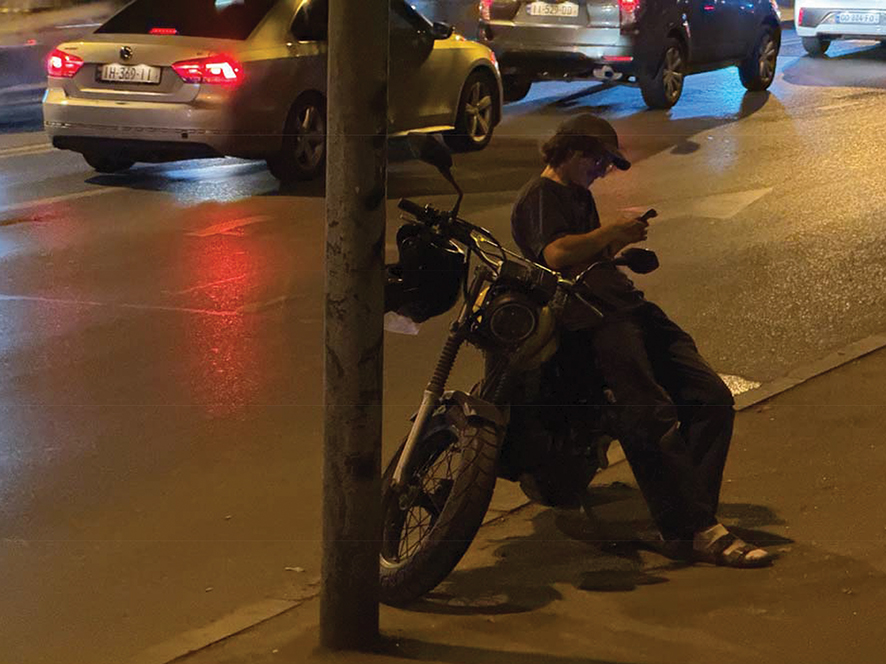
Festivals Without Stages
The real story of TKESHI 2025 is not the forest it lost but the network it built. And perhaps this is the more durable form. When a festival is forced to operate without a central stage, it becomes a kind of laboratory — for how music circulates, how people gather, how art responds to the texture of the present.
In the language of media theory, TKESHI has moved from being a “site-specific” event to a “situation-specific” one. It responds not to location but to condition. And this condition — one of aesthetic experimentation amid civic uncertainty — may be the defining context for cultural production in Georgia for the foreseeable future.
TKESHI doesn’t offer solutions. It offers forms. It tests whether a media festival can be both locally embedded and globally coherent, politically aware without being dogmatic, and artistically ambitious without being self-serious. That it managed all this — in a moment of overt repression and logistical chaos — is its most important accomplishment. And that it sounded, at times, quietly brilliant — that’s just a bonus.
Review by Ivan Nechaev

